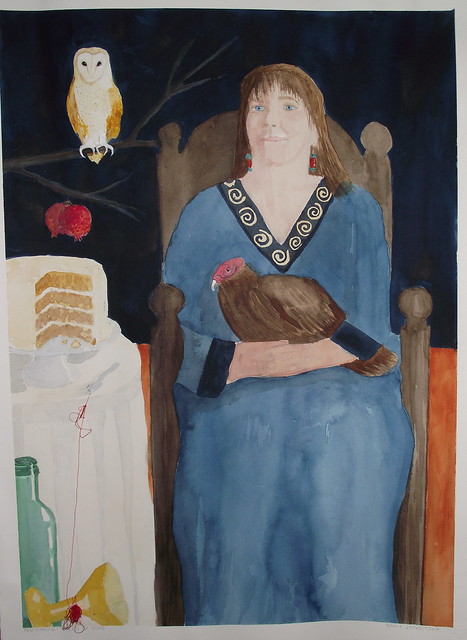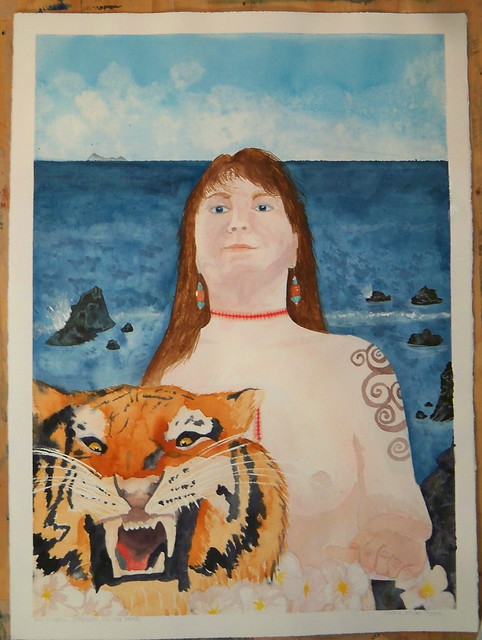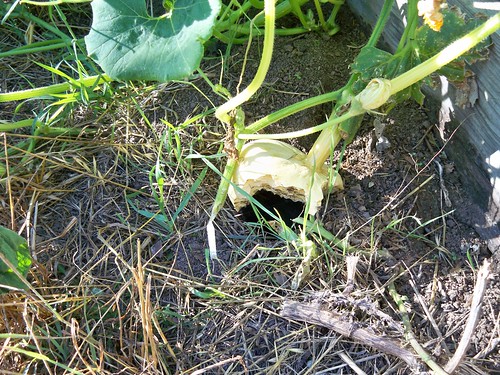My parents didn’t drink much. Sweet wine with Sunday dinner; maybe a can of beer with pizza on Saturday night. There were some bottles of liquor that would come out if there were visitors on Christmas, and a bottle of whiskey that came out for a couple of male visitors: a family friend who was like a grandfather to us, and the monsignor from church.
Continue reading Pentecost
Tag Archives: addiction
Red Thread: The Devil
Red Thread: Queen of Cups

Watercolor and red thread; 22″x30″. Click image to view on flickr. Here’s the whole Red Thread series to date.
It’s Not About the Food
I have a really clear memory of kindergarten, of standing in line at the door to the school, waiting to go back inside after recess. I was trying to talk to the girl in front of me when she stopped me cold. “I can’t be your friend because I don’t like fat people. And you’re fat.”
Even then I knew she was verbalizing something I’d already felt from other people. That didn’t make it any easier. But that feeling is something I’ve carried with me through life, even during the times when I got closer to or even achieved a “normal” weight.
I often felt like the adults in my life tried to push me in opposing directions simultaneously over my weight. I endured lectures about self-control and the simple, rational solution of eating less food. But when I tried to eat differently, perhaps trying out a diet book, I was told, “you’ll eat the same food the rest of us eat.” Or, if I managed to lose weight, special “treats” were presented…low-fat versions of ice cream or other goodies, that in reality only set binges off for me. In retrospect, it’s easy to see how food wasn’t just food. Food was an symbol of control, power, and, of course, love. No one was consciously trying to make things difficult for me; they were trying to help. But my problem wasn’t food. My problems were about things like control, power, and love.
In high school, I figured something out. I realized that the adults really weren’t watching as carefully as I thought. The chaos of everybody trying to get ahead, trying to keep up, the din of the constant radio and TV—all of these things created an atmosphere where I could retreat into myself. Not being noticed had always been a strategy, and I was getting good at it. Books especially were a solace; a good story could create a bubble of relief around me.
Running was a big craze at the time, and I had a crush on a boy on the cross country team. It seemed like a good way to lose weight. So I took up running. But, because of the crazy way my own brain works, just running wasn’t enough. So I quit eating. In the morning, it was pretty easy to get out the door without breakfast. And at school, it was easy enough to skip lunch. In the afternoon, the school bus dropped us off and I’d go straight into the house, change clothes, and go for a jog.
After that, I’d make tea. For a teapot, I’d use a 4-cup pyrex glass measuring cup. I’d put three teabags in it and then prop myself up on the couch with my homework or a book. Mom usually left instructions for getting dinner started, so I’d do that, too. At the dinner table, I’d take the smallest portions I dared, and skipped dessert. Everyone was happy.
I felt good during this time. Very light and airy. It made me feel very pure, in a spiritual sense. It was like becoming an angel.
It takes a while for weight loss to show, especially if you’re wearing the same clothing. One day, as we were getting ready for church, I found a skirt and blouse I hadn’t been able to wear before, but could wear now. I looked at myself in the mirror and knew I had changed.
When I went downstairs, I wasn’t able to escape notice any more. My brothers and sister even noticed. “Teresa got thin!” My mom and dad beamed. Everyone was happy.
During the next week, it was open house at school. I looked forward to wearing the same outfit, but worried that I’d already gained weight back. I’d started to slip on my eating. But of course, in reality I was still the same size; it had only been a couple of days!
I got lots of compliments and attention. My teachers were happy for me. And the boy I had a crush on talked to me a lot that night.
But something about all that attention worked against me. I couldn’t sustain the dieting anymore. I retreated back into my food underworld.
I would go through more phases of this as a teenager and young adult. And I would go on “sensible” diets created by giant corporations, or eating plans outlined by breathless authors who always seemed to hold the key to slenderness. My path in life has taken me through all of the big three eating disorders: anorexia nervosa, bulimia nervosa, and binge eating disorder. I always felt unlucky that anorexia was the least of these three for me…those were the lucky ones, I used to think…at least they get thin. But I know better now. I wouldn’t enter that hell again for anything in the world.
I’m not cured of eating disorders by any means. It may be like alcoholism: that I’ll never be “cured”, but can walk a path of recovery instead of being at their mercy. I can say that life is better than it’s ever been for me, particularly with eating. I don’t weigh myself anymore. I eat what I want, when I want it. I think more about the choices I make and what the food is going to do for me as fuel for my physical body. There are “good” days and “bad” days with respect to eating, but the good days are outnumbering the bad days. And when it’s a bad day or stretch of bad days, I’m more likely to remember to journal, to write, to do art, to get out in nature…and those things all help. I’ve lost some weight over the past few months; it both delights me and terrifies me. I try not to look at it too closely, because that’s fuel for the eating disorders. The size of my body really isn’t the important thing. That may not make sense to most people, and that’s ok. It’s taken me nearly five years of therapy and a lot of work to understand it myself.
The paintings that I’ve been posting here recently, those in the red thread series, are very much about my disordered eating, addictions, and a path to recovery and healing. Like many other addictive behaviors, eating disorders are a rejection of life, either by starvation or by dulling the senses into torpor. They seek to cut us off from our body and hearts; by giving us a sense of control, they separate us from our life force and our passions, especially those that might be frightening to others. They try to separate us from our true nature and destroy our feelings and ability to connect with the outer world.
It’s not about the food.
Red Thread: Strength, on the Mend
Grace at the DMV
My last name has changed back as part of the divorce. I like to say that I’m taking the name of my niece and nephew, because they took such good care of me last fall, and because I hate the idea of going back to anything. Whatever the case, it now means a series of trips through bureaucracies to do the name change.
The social security office was my first stop, and relatively painless. In a few days, my new card arrived in the mail, and I was able to start the next round: the dreaded DMV. I didn’t mind having to get a new license; just last December I’d had to have my license renewed and a new photo taken. My photo was predictably horrible, my face swollen by weeks of crying and the last vestiges of alcohol. I felt lucky to replace it. That horrible version of my driver’s license had replaced the one I got when my name changed before, one of my best ID photos ever: a newlywed.
So I took the day off work, took a water bottle and plenty of things to keep myself busy, and sat in the DMV office for a couple of hours until my name was called. I approached the clerk and handed over my papers, bracing myself for bad news about something I missed or something I’d done wrong.
The clerk smiled as he took my papers, looked over my name change form and my social security card. Then he stopped, looked up at me, smiled, and said, “You’re a brand new person!”
“I guess so.” I said.
He looked through the rest of my papers, came to the court papers, made a couple notations on the computer. Then he looked up again, and said, quietly and sincerely, “I’m sorry for the reason.”
I thanked him but also innerly cursed him as the tears welled up in my eyes. I never know when it’s going to hit me again. And there’s something about this simple, heartfelt human contact that always makes me cry. I can stand just about anything other than a little tenderness.
Trying to lighten the mood and avoid having a teary photo taken, I joked with him. “Don’t you think I look better now?”
He agreed. “You’re all set now. Take these over to window 18 and they’ll get your new photo.”
 |
 |
 |
Not Rising Above It
It’s clear that a lot of my addictive nature is the avoidance of feelings. I find I really don’t understand feelings well at all. In fact, I often can’t identify my feelings with precision, at least not without serious reflection.
Turns out, I’m not alone in this. I’ve been using this list of feeling words recently, something suggested to me by a nutritional therapist a few years ago. I’m usually scrolling down for the negative feelings…funny, I don’t seem to need to reflect on the happy ones so much.
Identifying the name of the feeling helps. It’s gives me something to mentally grab onto so I can pivot around and look at the situation from another angle. OK…uncertain, frustrated, vulnerable, discouraged…now named, they are easier to deal with. My judgmental mind likes to have reasons, and “I don’t know…I’m just…ick” doesn’t appease that part of my brain the way “uncertain, frustrated, vulnerable, discouraged“ does. How would I treat a friend who was feeling those things? Naming the feelings takes away some of their power to overwhelm me, and makes compassion possible.
”Uncertain, frustrated, vulnerable, and discouraged” described my feelings earlier this week. Getting the yurt ready for the winter has been on my mind. The windows really need an overhaul, and I want to re-tarp the top. My landlord wasn’t keen on paying for a new tarp…“the one that’s on there is a 5-year tarp and it’s only been on there one year!” But her disagreement came to a swift end when our recent high winds created two large rips in the outer tarp. Now we both agree: I’ll get a new one. I’ve also been looking at the top rafters with some level of fear…how is that wood doing? Are those brackets going to continue to hold? My brother promises to come for a visit in a couple of weeks to go over things and help me make an action plan.
Then there are the pests…not just the “pests of the mind”, but the real live variety, with tails and teeth. The local birding mailing lists talk of rodent populations being high this year, with eager excitement about a possible influx of hawks. But I am less happy about trapping rats in the yurt or finding a pristine gopher tunnel exiting the ground right under a beautiful squash that I was watching daily in anticipation of harvesting it. The squash is now mostly-eaten, looking for all the world like a cute porch over the entrance to the gopher hole.
When the gophers and voles aren’t popping out of holes to munch on plants that overgrew the raised beds, I see them simply scampering over the wooden sides of the beds to get their snacks. Poor boundaries; it’s a familiar problem. I’m told that feeling the sudden anger and fear rise up in me is a sign that my boundaries have been crossed, and that is how I feel when I see the gophers making a mockery of the raised beds. Anger at their destruction, but more fear that people will notice this proof of what a terrible gardener I am. (Oh hey, hello there, Pride…)
The irony of all of this is that the very night I returned home from helping with the “Gardening Without Enemies” workshop, I walked in to find a dead vole smack in the middle of my floor, and woke that same night to the sounds of a rat rummaging through my kitchen. Clearly, I am a total sham. (Well, it’s true that I don’t think of them as enemies. But still!)
Sometimes I think I would like to write here about how I’ve really fixed things up, how my garden is producing food that I’m eating and preserving for the winter. I’d like to brag about my neat woodpile, the oranges and greens of beautiful squash, the careful soil preparation I’m doing as I think about the apple trees and other perennials I’ll plant this fall. I’d like to write about how much I’ve healed and grown up through the divorce, and how I’m now emotionally perfect and don’t care to be loved by anyone else in my pristine solitude at the top of this romantic ridge in this picturesque yurt.
The reality is so very different. I’m lazy, ambivalent, prone to flights of fantasy, way too needy, and the custodian (or prisoner?) of some pretty ugly feelings (and absolutely certain that no one would like me if they knew I had those feelings). Reality is messy and uncertain and, yes, sometimes wonderful too. My therapist doesn’t usually tell me anything, but recently told me this: ”If you want to play in this part of the world, you can’t rise above it. And if you have to rise above it, then you don’t get to play in this part of the world.“
And this is gets me to the core. The addictions are attempts to escape this truth. The constant striving to escape this part of the world, because it seems so messy with feelings. To aspire to something more tidy and orderly than this mucky life here on earth, and if I can’t do that, then just check out altogether. The goal setting, the list making, the project planning…all of these are great for getting work done in the ideas part of the world, but they are a poor approach for life itself. Life must be lived, and life will not be compartmentalized nor follow the rules I make up for myself (or from others).
I want to live life. I want to play in this part of the world. With all the other critters.
What does it mean to really have our feelings? What’s the difference between having my feelings and getting attached to them? Intellectually, I think the idea is to accept them, let them arise in my life and then, as easily, let them go. But is that really all there is to it? Is that really enough? What about expressing them? Do I need to express all of my feelings to live in a truly honest way?

